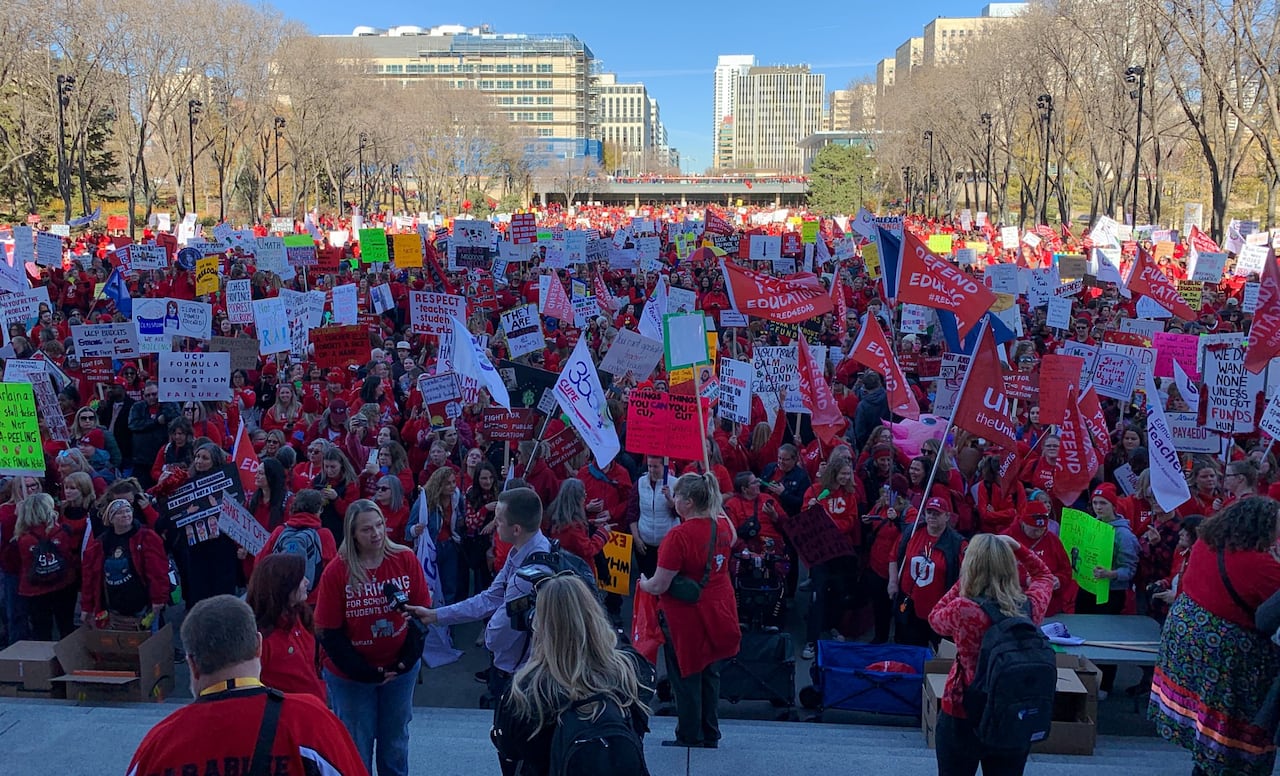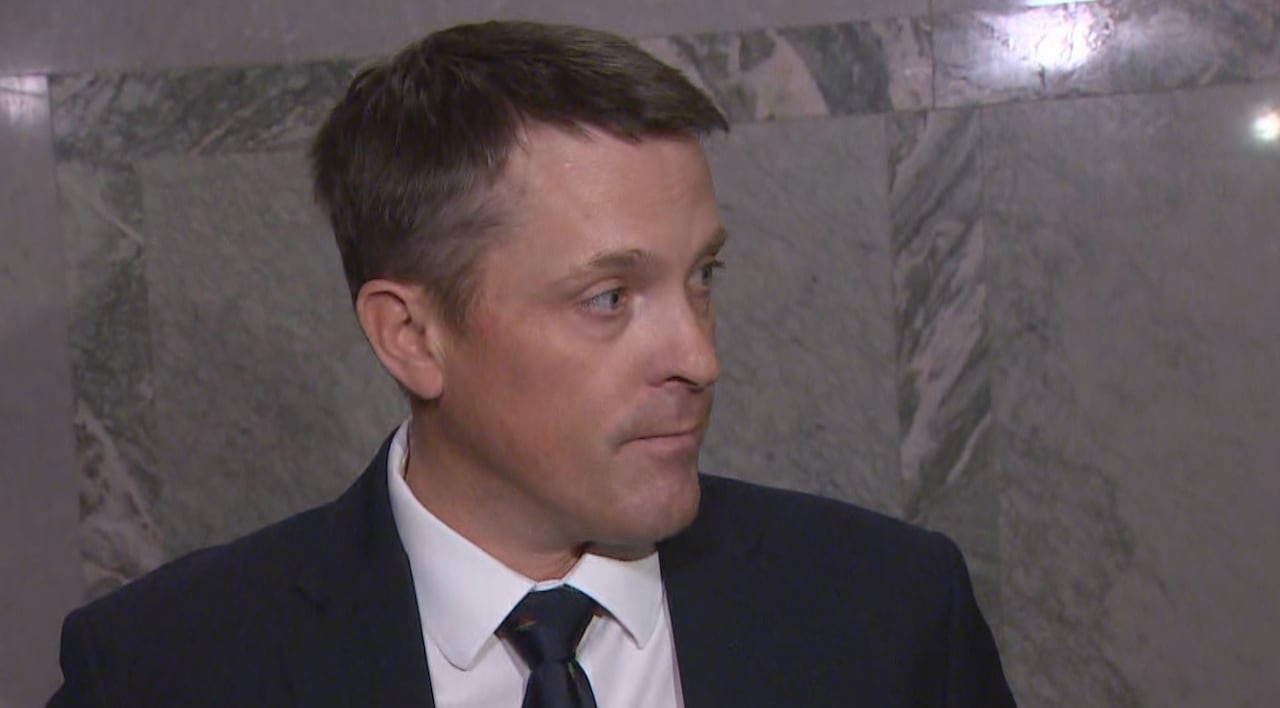The Alberta government will table back-to-work legislation on Monday that seeks to end the provincewide teachers’ strike, Premier Danielle Smith said Thursday morning.
The government served formal notice Thursday that it would be introducing Bill 2, known as the Back to School Act, announcing it via an order paper published on the Alberta Legislature’s website.
“The precondition has to be getting kids back to school and so far, [the teachers’ union has] been unwilling to do that,” Smith said during a news conference. She added that, although it’s still possible to reach an agreement by Monday, the government feels that’s unlikely.
“They came back with an offer that moves even further apart rather than closer together. So we would like to see a realistic approach that allows us to address the issues of classroom complexity, but we have to get kids back in the classroom,” she said.
With 51,000 Alberta teachers on strike for the third week, the provincial government is looking to end it. On Thursday, it served a formal notice that it will introduce Bill 2, referred to as the Back To School Act.
About 51,000 public, separate and francophone school teachers across the province have been on strike since Oct. 6. Roughly 750,000 students have been out of their classrooms for more than two weeks.
The strike started more than a month after negotiations broke down between the government and Alberta Teachers’ Association. Salaries, classroom sizes and help with student complexities have been the major sticking points.
The provincial government has offered a 12-per-cent wage increase over four years and to hire 3,000 more teachers to help with overcrowded classrooms. Teachers have rejected that offer.
The strike started while the legislature was on its summer break. But the fall session begins Thursday with the throne speech. Smith and other government officials previously suggested back-to-work legislation could come the week of Oct. 27, the first full week of the new session.
Opposition NDP Leader Naheed Nenshi condemned the move in a statement issued Thursday, calling the upcoming legislation “an attack on teachers, on public education, on all workers and their unions.”
In a statement to CBC News Thursday morning, the teachers’ union said it anticipated that the government would introduce back-to-work legislation, but that it needs to see the bill to comprehend what it actually means for teachers.
“Our members have been looking for a negotiated settlement. They’ve been very clear about what they’re looking for in terms of ways to improve our classrooms, to improve the experience of our students, and for themselves,” union president Jason Schilling later told CBC News in an interview.
“The expectation would be that government has heard what teachers’ concerns are and have addressed that in this legislation, if they’re not going to return to the negotiating table to talk about it there.”
Smith noted several times Thursday that there is still time to negotiate a deal.
“Strikes are part of the collective bargaining process, but when you get to a point where irreparable harm is being caused to kids, that’s where we have to draw a line and we have to make sure those kids are back in class,” she said.
“We’ve never had a strike of this nature or magnitude before, or one that has carried on this long. … We want to make sure that the kids are back in class, so they don’t have any more disruption in their learning.”
Teachers rally at legislature
Thousands of educators from across the province are expected to assemble on the legislature grounds in downtown Edmonton Thursday afternoon, rallying for better support for the public-education system.
During the weeks-long strike, some teachers have told CBC News that they were unsure what the reaction would be if they were forced back to work, and if people would abide by the legislation.

Schilling did not directly answer whether teachers might defy the back-to-work order. But he did say the union would review Bill 2 once it’s tabled, and determine next steps from there. One avenue, he said, is legal action.
“Teachers need things for their classrooms so their students can succeed and thrive. But it’s also, my colleagues across the province feel mostly disrespected by this government,” Schilling said, adding that they will interpret choosing return-to-work legislation, instead of negotiating, as disrespect.
Multiple educators at Thursday’s rally expressed disappointment about Bill 2 and its potential implications, because it means they would return to the same work environment.
“The way that this government has been treating us is making me feel like I don’t want to be a teacher here anymore,” Charlotte Rollans, a Grade 6 teacher in Edmonton, told CBC News during Thursday’s rally.
“Whether that means I leave the profession to do something else, or I leave the province to go teach somewhere else, I’m not sure. But just knowing that I might be going back to the same thing that I’ve been dealing with is really discouraging.”
Rollans and others said they would ultimately take direction from the union when it comes to following Bill 2, if it passes.
Feikje Deinum, a special needs teacher at a junior high school who attended Thursday’s rally, is among those who wouldn’t return to work, even though that isn’t what she wants to do.
“I really don’t think we’re ready to go back,” Deinum told CBC News. “I think that what has been proposed has not been enough, and it feels like we’re going back to the exact same thing that we’re trying to fix.”
Jason Foster, a labour relations professor at Athabasca University, told The Canadian Press that teachers could simply follow the order, return to classes and go into binding arbitration with the government.
Alternatively, the union could partially comply with the order by returning to schools but limit their teaching activities to continue pressuring the government in binding arbitration.
A third, extreme option, would be defying the order altogether, putting teachers in direct conflict with the law.

“We’re looking to end the strike,” Finance Minister Nate Horner told reporters later Thursday. His ministry, through the Teachers’ Employer Bargaining Association (TEBA), is leading negotiations for the provincial government.
“Unions are going to have to decide what it is they want to do, or feel they need to do, but that’s our goal.”
The parties are still far apart based on the last offer from the ATA, Horner said. If the union wants to negotiate further, instead of having teachers be legislated back to work, he said the union needs to formally request dates from TEBA immediately.
The order paper published Thursday doesn’t offer details to the upcoming legislation, but it outlines how the legislative process could play out.
For a government bill to become law in Alberta, it must pass through two readings in the legislature, get vetted by the committee of the whole, pass a third reading and receive royal assent. The order paper moves to push Bill 2 through two or more of those stages in one day, and to only allow one hour of debate during each phase.
“The time allocation motions give us the opportunity to pass that bill quickly,” government House leader Joseph Schow told reporters Thursday.
“We’ll assess how things look on Monday.”
The NDP will be opposing the attempt to expedite the legislative process, particularly given the United Conservative Party government could have resolved the labour dispute without using legislative power, Official Opposition House leader Christina Gray told reporters Thursday afternoon.
“Labour across Alberta, but also across Canada, is watching what is happening,” Gray said.
The right to collective bargaining and strike are protected constitutional rights, she said.
“Yet we see this so-called freedom-loving government rushing to take those away.”
Return could be quick: minister
Education and Childcare Minister Demetrios Nicolaides couldn’t give a timeline as to when students could be heading back to school, should the bill pass, but he hopes a return could be arranged quickly.
“Our school boards are aware that legislation is coming forward to bring students back to school; they know we have a majority government, that the bill is likely to pass. So they can look to that and make some preparations,” Nicolaides told reporters.
“I, of course, can’t provide any direction without the right legislative framework, so that does need to be in place, first and foremost.”
Grade 10 student Jason Dje and his father, a francophone school principal, travelled to Edmonton from Calgary to attend Thursday’s rally. Dje told CBC News that he is stressed about the strike and potential return to school.
“I’m starting to think about, when we start to go back, how the whole thing is going to be throughout all the tests and assignments,” Dje said.
“Everything’s going to be rushed.”






